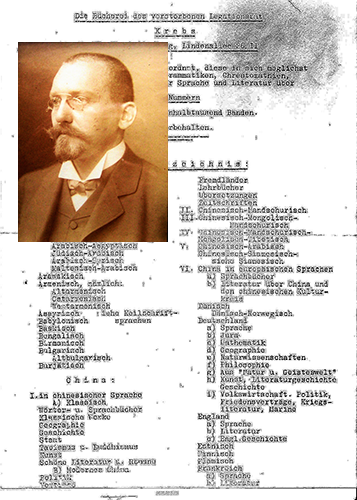

|
Emil Krebs* November 15, 1867, in Freiburg (Swiebodzice)† March 31, 1930, in Berlin |
Emil Krebs is one of the greatest, perhaps even the greatest language prodigy worldwide. He mastered 68 languages. His private library containing writings in 111 languages was acquired in 1932 by the American National Library, "Library of Congress," Washington D.C.
Special writings, some gifts from the former Chinese imperial household, are kept separately in the Jefferson Building due to their outstanding value.
Krebs was born on November 15, 1867, in Freiburg/Silesia (now Swiebodzice) and spent his childhood and youth in Esdorf (Opoczka), Schweidnitz County (Swidnica).
As a high school graduate of the Evangelical Gymnasium Schweidnitz in 1887, he was already proficient in 12 languages. He began studying theology and philosophy in Breslau (Wroclaw). In Berlin, he studied law, Chinese, and Turkish.
From 1891 to 1893, he worked as a court assessor, including at the Kammergericht Berlin. The German Foreign Office, Berlin, sent him to China in 1893 as an interpreter, where he stayed for 24 years.
As chief interpreter (from 1901) of the German Imperial Embassy in Beijing, he gained a reputation as an outstanding authority on Chinese, Mongolian, Manchu, Tibetan, Japanese, and Korean.
"A phenomenon," "a polyglot celebrity," as Ambassador Otto von Hentig describes him in his memoirs.
After his return to Germany (1917), he worked as a staff member in the language service of the Foreign Office. There he translated from over 40 languages. "Krebs replaces 30 field service employees for us!" once remarked the then head of the language service (Gautier).
Even today, Krebs is considered there as the preeminent polyglot.
His writings and books used for language studies prove that he did not solely learn foreign languages from German but also used his already mastered languages as "intermediate languages."
In individual cases, he did not even resort to his mother tongue. As an "intermediate language" alongside German, Krebs predominantly used English, French, Russian, Chinese, Greek, Italian, Turkish, Latin, Spanish, Arabic, and Dutch for learning and deepening a new language.
Krebs died on March 31, 1930, in Berlin. His brain is still available for research purposes at the Jülich Brain Research Center (Heinrich Heine University, Düsseldorf).
His still existing grave is located in Germany's second-largest cemetery, the Südwestkirchhof Stahnsdorf/near Berlin.
Further Information:
Pictures from a private photo album "Emil Krebs - A Life in Pictures"
Works by and about Emil Krebs "Publications"
Certificates of study "Emil Krebs Library"
Eckhard Hoffmann (great-nephew) "My Journey to Uncle Emil"